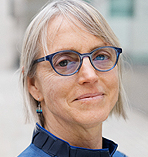NAS Award in the Neurosciences

About the NAS Award in the Neurosciences
The NAS Award in the Neurosciences is awarded every three years to recognize extraordinary contributions to the progress of the neuroscience fields, including neurochemistry, neurophysiology, neuropharmacology, developmental neuroscience, neuroanatomy, and behavioral and clinical neuroscience. The award was established by the Fidia Research Foundation and is presented with a $25,000 prize.
Most Recent Recipient
 |
Nancy Kanwisher, Massachusetts Institute of Technology McGovern Institute for Brain Research, received the 2022 NAS Award in the Neurosciences.
Kanwisher is a pioneer in cognitive neuroscience known for her landmark discoveries about the functional organization of the human brain.
Her research using functional magnetic resonance imaging and behavioral testing have illuminated the neural and cognitive mechanisms underlying human visual perception and cognition. She is credited with co-discovering and characterizing the fusiform face area in the human brain, a region that she has shown to be specifically engaged in the perception of faces. Read more about Kanwisher's work»
Watch Kanwisher's acceptance speech»
Award History
Seymour S. Kety and Louis Sokoloff became the first recipients of the award in 1988 for their work developing techniques to measure brain blood flow and metabolism. The techniques developed remain valuable to the study of brain function and maintain application in clinical medicine. Kety’s nitrous oxide method to measure the brain’s blood flow revolutionized research on the human brain. His theory of inert gas exchange between blood and tissues sought to measure more localized measurements in the brain rather than the brain’s as a whole, which is what the nitrous oxide method measured. In translating the theory to method, Sokoloff collaborated with Kety to translate Kety’s theory to an operational method. The work completed by the two in made huge strides in the field of neuroscience. Previous recipients of the NAS Award in the Neurosciences continue to achieve outstanding advancements in their fields. Five recipients have been honored with a National Medal of Science, three recipients have received a Lasker Award, and one recipient has received a Nobel Prize in Medicine (Greengard 2000).
Recipients:
Nancy Kanwisher (2022)
For her groundbreaking insights into the functional organization of the human brain, including the discovery of neocortical subregions that differentially engage in the perception of faces, places, music and even what others think, thereby linking modularity of mind theories to neuroscience.
Read more about Kanwisher's work»
Watch Kanwisher's acceptance speech»
Eve Marder (2019)
For her body of work that has transformed the perception of neuronal circuits as static structures well-described by connectivity diagrams, to our current understanding of microcircuits as flexible and dynamic entities that efficiently balance the needs for plasticity and stability.
Read more about Marder's work»
Watch Marder's acceptance speech»
Mortimer Mishkin (2016)
For fundamental contributions to understanding the functional organization of the primate brain, including discovery of the visual functions of inferior temporal cortex, the role of the dorsal and ventral visual pathways in spatial and object processing, and anatomical descriptions of cognitive and non-cognitive memory systems.
Read more about Mishkin's work»
Watch Mishkin's acceptance speech»
Solomon H. Snyder (2013)
For the elucidation of fundamental mechanisms of chemical signaling, including opiate receptors, NO signaling, and other neurotransmitter/receptor interactions.
Roger A. Nicoll (2010)
For his seminal discoveries elucidating cellular and molecular bases for synaptic plasticity in the brain.
Jean-Pierre Changeux (2007)
For the pioneering discovery that fast-acting neurotransmitters mediate their effects through allosteric regulation of the neurotransmitter protein.
Brenda Milner (2004)
For her pioneering and seminal investigations of the functioning of the temporal lobes and other brain regions in learning, memory, and speech.
Seymour Benzer (2001)
For his pioneering contributions which have brought neurogenetics to maturity. Benzer's discoveries in fruit flies have identified specific genes contributing to behaviors of central importance.
Vernon B. Mountcastle (1998)
For his discovery of the columnar organization of the mammalian cerebral cortex and for original studies relating behavior to function of single cells in higher cortical areas.
Walle J. H. Nauta (1994)
For development of a powerful method for determining connectivity among specific brain sites and thus establishing now-classical circuits in the limbic system.
Paul Greengard (1991)
For his discovery of the central role played by neuronal phosphoproteins in normal brain function as well as in neuropsychiatric and related disorders.
Seymour S. Kety and Louis Sokoloff (1988)
For developing techniques to measure brain blood flow and metabolism -- valuable tools in the study of brain function that have major applications in clinical medicine.

